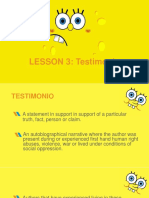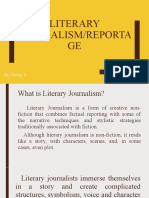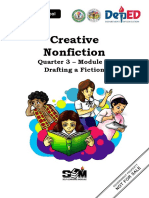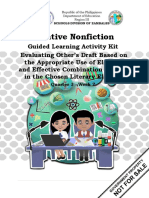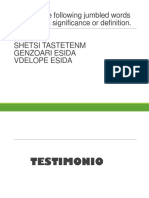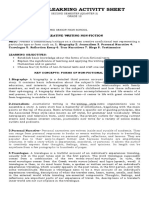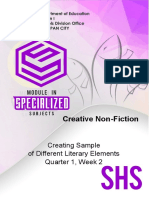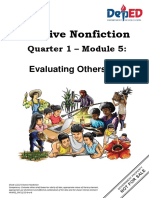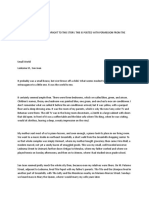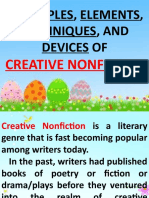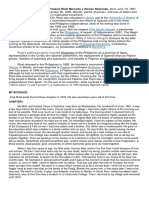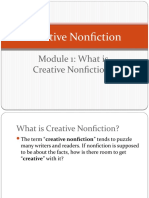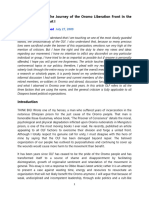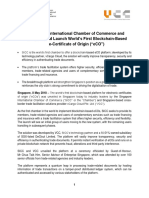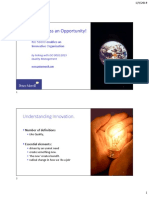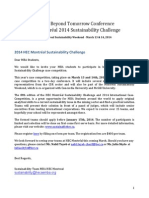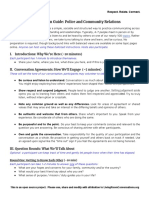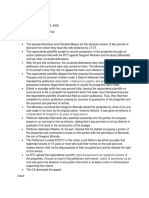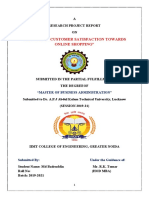Professional Documents
Culture Documents
Testimonio
Testimonio
Uploaded by
Kerra Elaizza DinoOriginal Description:
Original Title
Copyright
Available Formats
Share this document
Read this document in other languages
Did you find this document useful?
Is this content inappropriate?
Report this DocumentCopyright:
Available Formats
Testimonio
Testimonio
Uploaded by
Kerra Elaizza DinoCopyright:
Available Formats
A testimonio is
a first-person account by the person (narrator) who has faced
instances of social and political inequality, oppression, or any specific form of
marginalization.
Testimonio, a Spanish term understood as “witness account”, embodies a
narrative research methodology rooted in Latin American history.
Testimonio, is directly translated to the English word “testimony,” but there are
important differences between the two words. “Testimonio” is a literary genre and is
not bound by the same legal obligations to “truth” which are equated with “testimony”.
Testimonio is generally considered a fact-based first person narrative of injustice,
seeking to represent the experiences of a larger social group, with the aim of rallying
support to create more just future. While there may be similarities, testimonio is not
the same as other non-fiction genres such as biography, autobiography, and historical
texts.
As opposed to other forms of creative non fiction, in testimonio it is usually the
narrator her/himself who is the research tool, with an interest in telling the story from
that individual perspective which, in turn, represents a larger, collective story that
took place in the community that the narrator inhabits.
The goal of testimonio as a form of narrative inquiry, then, transcends awareness and
gravitates toward political intention, questions about institutional power, the need to
speak for justice, the creation of stronger pockets of resistance, and the importance of
solidarity and coalition as keys to building more equitable social frameworks
It has the same characteristics with personal essay because it is written in the first-
person point of view. But unlike personal essay, which primarily revolves around the
personal development or experience of the author, a testimonio recounts personal
experience of an author being oppressed or has experienced and witnessed the
lives of the people in the socially impoverished state and has become a victim of
human rights violation. Testimonio is different from academic papers since its main
purpose is to call the attention of leaders to hear a plea. Read this example.
Who uses the concept?
A myriad of fields in human and social sciences have adopted testimonio as
their methodological tool of choice. Scholars from Chicana/o Studies, feminist studies,
multicultural education, and indigenous studies have integrated testimonio into their
first- hand accounts of issues of marginalization and oppression.
Testimonio becomes relevant for intercultural dialogue because it seeks organic
intellectuals that help outsiders learn about the local history of the communities that
have suffered marginalization. Testimonio provides an open invitation to engage in real
dialogue with cultures and individuals.
Testimonio, as one of the truest indigenous research methodologies, has
potential to highlight stories from marginalized communities.
For students within academe, there is a limited comprehension of the expansive ethnic
genres for writing and reading, simply that traditional genres of prose and poetry exist.
In “Voices for the Voiceless,” Gugelberger and Kearney explain the major
proponents of testimonio that separate it from similar genres: testimonio is concerned
with the future, not the past; it is concerned with the collective society, not the
individual; and there is a learning process involved that inspires readers to act for
justice and aims to destabilize authority.
Three different kinds of testimonio: forensic, epideictic, and deliberative.
Forensic speech asks decision-makers to categorize past actions as just or unjust.
Epideictic speech is addressed to spectators, whom it asks to categorize present
actions as noble or shameful; its means are praise and blame.
Deliberative speech asks decision-makers to determine whether or not to undertake a
future action; its means are persuasion and dissuasion.
A Bird in the Cage
Published by: Shacyne Mondano
This testimonio is from my mother’s story of her life.
I was born in the province of Bohol. I was the fifth child of twelve. My parents are both
farmers. We were living in a simple house at a top of the mountain. And as the eldest
among my sisters, I was responsible for all the household chores and serve as the
mother of my younger siblings by taking care of them while my parents are on the
farm. It was so hard for me to study because our school is about 4 kilometers away
from our house and it was located at the bottom of the mountain. So, I must walk
every day before and after class. Every time I got home, I was so exhausted wanting to
sleep but my mother always forced me to do the household chores or else I will be
punished. So, I have no choice but to do what she asked me. My everyday life is so
tiring and difficult. My mother always treated me so badly. I never feel the love of a
mother. And my father, he always came home drunk but even though he’s drunk he
never laid his hands to us not like any other drunks who always messing around
violently. There are times that we don’t have food to eat because he spends the money
in drinking and in the cock fighting. Every time he went home my mother scolded him.
Almost every day there is a war in the house. But despite all those happenings in my
life, I was so proud of myself.
Since elementary to high school, I was a consistent honor student. My medals
and achievements are my precious possessions. Every day and every time I received
awards, I always thank God for always staying with me in times of trial and
happiness. My faith in God will never ever disappear. And I also have faith that I will
enter to college despite of our poverty. It is the only way that I can see to escape from
this way of living.
But my mother told me no, “you can’t go to college. We don’t have money for your
expenses, and you should help me feeding your siblings. You should go to work!”. My
heart broke and shattered. I cried and cried when I got home. I can’t accept that I
can’t go to college. I really want to go to college. Any course is fine for me I just want to
go to college. But no matter how many times I beg she never listened but instead she
shouted at me forcing me to do the work.
I was hired as a helper at a Chinese convenient store for two months and I
eventually went to Mindanao because my Uncle promised me to help me finished my
education. But when I get there, he made me as his child’s babysitter. I thought I
could continue my study. I was so disappointed and upset.
How long should I endure this terrible cage of mine? How long do I have to
wait before I get my freedom? It’s been FOUR YEARS of working in different stores and
houses! Does my right in education have already been forgotten? I can’t accept this. I
don’t want to stay in this kind of life forever! I must do something.
Then, my older cousin heard my complaints. She offers me her help; she is
willing to pay for my enrollment and expenses for just a year. But the problem is, will
my mother allow me to return to school? Knowing that it can affect my work?
I was so desperate. I must tell my mother that I really want to enter college. I was so
nervous and scared. What if she rejects the offer? What will happen to my future? I
was completely shocked. My mother has given the permission to accept the offer. My
heart is overflowed with joy. I was so happy after FOUR YEARS finally I can truly go to
college.
I take the vocational course, nursing aid. And as promised I finished it in a
year. After that, my cousin brought me to the brother of her master who is a doctor to
assist him on his clinic because his wife is on abroad. But I never expect that he is the
person who can help me finished the college.
And now I am a licensed registered midwife who is currently working at the Hospital of
Carmona, Cavite.
Source: https://shane176.wordpress.com/2017/11/02/review-paper/
STEPS IN WRITING TESTIMONIO
Keep the “personal” in testimonio. We want to know what you have
witnessed. Tell us something we don’t know about the reality of life.
Find for more input. Research about people and place involved.
A good testimonio should contain an introductory paragraph, body
paragraphs, and a conclusion. The standard length is about five paragraphs,
but essays can be longer or shorter, as long as they contain all three basic
sections.
Create an essay outline. Drafting an outline first can help you lay out the
main points and tone of the message you are trying to share. Your outline will
help you figure out early on if this specific moment is worth writing about.
Whichever topic you choose for your essay, it must have had a strong emotional
impact on you or have taught you a lesson in some way.
Use sensory details about the sequence of events surrounding your thesis to
guide the reader through your personal essay. Build up your personal story
here to eventually lead the reader to your main point.
Be specific. Provide the details necessary about real life characters, place or any
particular feelings experienced.
Proofread your work. Aside from checking spelling and grammar. No matter
how good your writing skills are, it’s always helpful to reread your own work
and ensure you’ve solidified your story.
You might also like
- Study Notes ACCA - Financial Reporting PDFDocument211 pagesStudy Notes ACCA - Financial Reporting PDFLavinia Minoiu100% (1)
- Colin & John Online Book Store Case StudyDocument13 pagesColin & John Online Book Store Case StudyTop 10 zoneNo ratings yet
- CNF Analyzing Factual and Nonfactual ElementsDocument15 pagesCNF Analyzing Factual and Nonfactual ElementsCathelyn50% (2)
- Module 5-8Document8 pagesModule 5-8PhielDaphine Nacionales100% (2)
- Creative Non Fiction Weeks Weeks 9 12Document15 pagesCreative Non Fiction Weeks Weeks 9 12Azrael Ian Montefalco III100% (2)
- Lesson 3 TestimonioDocument11 pagesLesson 3 TestimonioJulynmae Rafols75% (4)
- I. Introduction To Literary Genres 1. Understanding Conventions of Traditional GenresDocument5 pagesI. Introduction To Literary Genres 1. Understanding Conventions of Traditional GenresJessica Caisip0% (2)
- True NarrativeDocument5 pagesTrue Narrativecj44% (9)
- Literary Journalism/Reporta GE: by Group 1Document18 pagesLiterary Journalism/Reporta GE: by Group 1Leo BalaZon100% (3)
- Creative Writing: Module No. 1 Imaginative Writing Versus Technical WritingDocument5 pagesCreative Writing: Module No. 1 Imaginative Writing Versus Technical WritingKristine Cantilero100% (1)
- Creative Nonfiction: Quarter 3 - Module 3: Drafting A FictionDocument22 pagesCreative Nonfiction: Quarter 3 - Module 3: Drafting A FictionHernan Pacatang67% (6)
- Creative Nonfiction Module 1 Lesson 1 ReDocument5 pagesCreative Nonfiction Module 1 Lesson 1 ReMish Phia Salcedo Lupina0% (1)
- Creative Non-Fiction q3 w7Document17 pagesCreative Non-Fiction q3 w7Mlyn100% (3)
- MODULE 1 - CHARACTERS and CHARACTERIZATIONDocument10 pagesMODULE 1 - CHARACTERS and CHARACTERIZATIONJessa Mae Gemilla100% (2)
- PPTDocument18 pagesPPTjenny anaud100% (2)
- Terms of ReferenceDocument8 pagesTerms of ReferenceABUAMMAR60100% (1)
- DLP Creative NF 9Document20 pagesDLP Creative NF 9Romy Sales Grande Jr.100% (2)
- Group 6 CNF TravelogueDocument6 pagesGroup 6 CNF TravelogueAlliah Mae Plazo100% (3)
- SLK Final Creative Non Fiction - Types of NonfictionDocument27 pagesSLK Final Creative Non Fiction - Types of NonfictionChristian Abella50% (2)
- Principles, Elements, Techniques, and Devices L2Document54 pagesPrinciples, Elements, Techniques, and Devices L2Jrick EscobarNo ratings yet
- Weekly Learning Activity Sheets: Creative Nonfiction 12, Quarter 4, Week 5-6Document10 pagesWeekly Learning Activity Sheets: Creative Nonfiction 12, Quarter 4, Week 5-6Marjorie Polistico67% (3)
- Creative Writing Nonfiction Week 5 6 FONZY RONEDocument6 pagesCreative Writing Nonfiction Week 5 6 FONZY RONEFonzy RoneNo ratings yet
- Cnfq2 Mod3 Analyze and Interpret A Well Written Creative Nonfictional Text Based On The Peer CritiqueDocument16 pagesCnfq2 Mod3 Analyze and Interpret A Well Written Creative Nonfictional Text Based On The Peer CritiqueAllysa Lacap BlasNo ratings yet
- Final SHS 12-Creative Non-Fiction-Q1-Module 2 - Creating Samples of Different Literary ElementsDocument24 pagesFinal SHS 12-Creative Non-Fiction-Q1-Module 2 - Creating Samples of Different Literary ElementsSil Marie MarambaNo ratings yet
- CNF MELC5 FINAL Field-Validated-updatedDocument19 pagesCNF MELC5 FINAL Field-Validated-updatedNiña Patrice Martesano Selar100% (2)
- ANALYZING Factual or Nonfictional ElementsDocument20 pagesANALYZING Factual or Nonfictional ElementsErica Atienza - Dalisay100% (2)
- Creative Non-Fiction - Q3 - W1Document20 pagesCreative Non-Fiction - Q3 - W1Mlyn67% (3)
- CNF Q2M2 Understanding Literary JournalismDocument26 pagesCNF Q2M2 Understanding Literary JournalismCherry FernandoNo ratings yet
- Literary Journalism-CnfDocument13 pagesLiterary Journalism-CnfGene PeliñoNo ratings yet
- Quarter 1 - Activity 3Document3 pagesQuarter 1 - Activity 3EVA MAE BONGHANOY100% (1)
- CREATIVE NONFICTION - Q4 - Module 1 Revised SLM PDFDocument20 pagesCREATIVE NONFICTION - Q4 - Module 1 Revised SLM PDFKylle ZabalaNo ratings yet
- Creative Nonfiction - Quarter 1 Module 2Document8 pagesCreative Nonfiction - Quarter 1 Module 2Reychel NecorNo ratings yet
- WLAS-Creative-Nonfiction-Week-3 - FinalDocument16 pagesWLAS-Creative-Nonfiction-Week-3 - Finaldonna belle m. intad100% (1)
- Creative Nonfiction SUMMATIVETESTDocument3 pagesCreative Nonfiction SUMMATIVETESTAdhel Lucas Pascual100% (2)
- Lesson 5-Reading and Writing DramaDocument17 pagesLesson 5-Reading and Writing DramaRyan Estonio100% (1)
- Lesson 9 ModuleDocument2 pagesLesson 9 ModuleDaniella May CallejaNo ratings yet
- Forms and Types of Creative Nonfiction: Lesson 5Document6 pagesForms and Types of Creative Nonfiction: Lesson 5Daniella May Calleja100% (1)
- Module 3 Creative NonfictionDocument37 pagesModule 3 Creative Nonfictionelmer riveroNo ratings yet
- DLP-Creative Nonfiction Revising A DraftDocument4 pagesDLP-Creative Nonfiction Revising A DraftArnold100% (2)
- Many MansionsDocument14 pagesMany MansionsMaleficent Idea83% (6)
- Creative Nonfiction Las 3Document4 pagesCreative Nonfiction Las 3Esther A. EdaniolNo ratings yet
- Creativenonfiction S1 Q2 M1Document2 pagesCreativenonfiction S1 Q2 M1Analie CabanlitNo ratings yet
- Chapter Iv - Reading and Writing Drama (The One-Act Play)Document3 pagesChapter Iv - Reading and Writing Drama (The One-Act Play)Marie Cielo Cenidoza94% (17)
- Creative NonfictionDocument15 pagesCreative Nonfictionwewe.trillanesNo ratings yet
- Principles, Elements, Techniques, and Devices Of: Creative NonfictionDocument26 pagesPrinciples, Elements, Techniques, and Devices Of: Creative NonfictionJane SemblanteNo ratings yet
- MODULE IN CREATIVE NONFICTION Week 3 and Week 4Document5 pagesMODULE IN CREATIVE NONFICTION Week 3 and Week 4Jaja Cabatic100% (2)
- Modules in Creative NonfictionDocument64 pagesModules in Creative Nonfictionandy0% (2)
- Angle in NonfictionDocument24 pagesAngle in NonfictionJhong Floreta Montefalcon50% (8)
- DLP-Creative Nonfiction Quarter 4 Week 2Document3 pagesDLP-Creative Nonfiction Quarter 4 Week 2ArnoldNo ratings yet
- Mini Critique: by Galo and CasiñoDocument9 pagesMini Critique: by Galo and CasiñoAngela GaloNo ratings yet
- Activity 1: My Travelogue: Learning Activity Sheets GRADE 11/12 - Creative NonfictionDocument4 pagesActivity 1: My Travelogue: Learning Activity Sheets GRADE 11/12 - Creative Nonfictionvieminem100% (1)
- Forms and Types of Creative NonfictionDocument37 pagesForms and Types of Creative NonfictionJoshua Clacio100% (1)
- José RizalDocument12 pagesJosé RizalIya Yae Carillo67% (3)
- Literary JournalismDocument18 pagesLiterary JournalismErica Atienza - DalisayNo ratings yet
- (Powerpoint) Creative NonfictionDocument83 pages(Powerpoint) Creative NonfictionAdrian Nicole DionisioNo ratings yet
- Differentiating The Types of Creative Nonfiction: Blog & TestimonioDocument4 pagesDifferentiating The Types of Creative Nonfiction: Blog & TestimonioDaniella May CallejaNo ratings yet
- Final SHS 12 Creative Non Fiction Q1 Module 3Document20 pagesFinal SHS 12 Creative Non Fiction Q1 Module 3Sil Marie Maramba100% (4)
- Creative Non-Fiction 12: Literary ElementsDocument8 pagesCreative Non-Fiction 12: Literary ElementsCristina Luz Cabana100% (1)
- Creative Nonfiction Module 2 Week 5 & 6Document8 pagesCreative Nonfiction Module 2 Week 5 & 6Arnold100% (4)
- Creative NonFiction Week 1 SLMDocument8 pagesCreative NonFiction Week 1 SLMDiana Jane Reyes100% (3)
- SHS SLM-CNF Melc8Document22 pagesSHS SLM-CNF Melc8Nhormie Maan Salazar- DesipedaNo ratings yet
- My Other Name by Gilford DoquilaDocument3 pagesMy Other Name by Gilford DoquilaKerra Elaizza DinoNo ratings yet
- LP Week 4 CNFDocument18 pagesLP Week 4 CNFKerra Elaizza DinoNo ratings yet
- LP Creative NF Week 1Document20 pagesLP Creative NF Week 1Kerra Elaizza DinoNo ratings yet
- Lesson Plan in Character SketchingDocument5 pagesLesson Plan in Character SketchingKerra Elaizza DinoNo ratings yet
- Criteria DramaDocument2 pagesCriteria DramaKerra Elaizza DinoNo ratings yet
- Lesson Plan CNFDocument2 pagesLesson Plan CNFKerra Elaizza DinoNo ratings yet
- Character Building QuizDocument1 pageCharacter Building QuizKerra Elaizza DinoNo ratings yet
- Introduction To Creative Non FictionDocument17 pagesIntroduction To Creative Non FictionKerra Elaizza DinoNo ratings yet
- Literary MovementsDocument2 pagesLiterary MovementsROBERT EDUARD LOGHINNo ratings yet
- Osha 1994Document35 pagesOsha 1994Aimi MohamadNo ratings yet
- Chapter-10-History - (The Legacy of The Mughals)Document2 pagesChapter-10-History - (The Legacy of The Mughals)Adam shakilNo ratings yet
- OLF Failure To Deliver by JawarDocument19 pagesOLF Failure To Deliver by JawarBulo FeyisaNo ratings yet
- Singapore International Chamber of Commerce and VCargo Cloud Launch World's First Blockchain-Based E - Certificate of Origin (ECO)Document4 pagesSingapore International Chamber of Commerce and VCargo Cloud Launch World's First Blockchain-Based E - Certificate of Origin (ECO)WeR1 Consultants Pte Ltd100% (1)
- Republic v. Vda de Castellvi DigestDocument3 pagesRepublic v. Vda de Castellvi DigestAlthea M. SuerteNo ratings yet
- Scribbr Example Edit Structure and ClarityDocument1 pageScribbr Example Edit Structure and ClarityErik NguyenNo ratings yet
- Never Miss An Opportunity Iso56000 Innovation ManagementDocument18 pagesNever Miss An Opportunity Iso56000 Innovation Managementokto wisnu nugroho100% (1)
- Baghdad, IRAQDocument16 pagesBaghdad, IRAQAr Dinesh GaikwadNo ratings yet
- BRU V2I3 INBAR Bamboo Fibre of The FutureDocument20 pagesBRU V2I3 INBAR Bamboo Fibre of The FutureBloom EsplanaNo ratings yet
- The Village BlacksmithDocument32 pagesThe Village BlacksmithLouie PascualNo ratings yet
- On The MantraDocument10 pagesOn The Mantrakrstas774No ratings yet
- Transaction Review RKPL, Draft ReportDocument13 pagesTransaction Review RKPL, Draft ReportJoni alauddinNo ratings yet
- Summary On Ra 8371Document6 pagesSummary On Ra 8371Ken AmorinNo ratings yet
- 4.24.2023 Second Addendum - List of Properties Dino Ferry - V.1Document8 pages4.24.2023 Second Addendum - List of Properties Dino Ferry - V.1NC BergoniaNo ratings yet
- Case Competition 2014 - HEC Montreal - InvitationDocument2 pagesCase Competition 2014 - HEC Montreal - InvitationJames MorinNo ratings yet
- 173697-Sep 2013Document52 pages173697-Sep 2013Ituzaingó GerardoNo ratings yet
- New-Police-Community-Relations 1Document2 pagesNew-Police-Community-Relations 1api-340746823No ratings yet
- M6 L4 Workbook v2Document11 pagesM6 L4 Workbook v2ugosacchi200No ratings yet
- Scan 10007Document4 pagesScan 10007api-198343131No ratings yet
- 29Document2 pages29gmcamaymayanNo ratings yet
- A Study On Customer Satisfaction Towards Online ShoppingDocument71 pagesA Study On Customer Satisfaction Towards Online ShoppingAyan Siddiqui100% (1)
- Every Breath You Take Uke Tab by The PoliceDocument4 pagesEvery Breath You Take Uke Tab by The PoliceJefri Nur FahmiNo ratings yet
- Ai 2306 CW1Document7 pagesAi 2306 CW1Will SkinnerNo ratings yet
- Carly Fischer ResumeDocument2 pagesCarly Fischer Resumeapi-491416439No ratings yet
- Van Schewick Letter To FCC Verizon Google WalletDocument10 pagesVan Schewick Letter To FCC Verizon Google WalletvanschewickNo ratings yet
- The Documentary-Note. Oxford. Referencing StyleDocument7 pagesThe Documentary-Note. Oxford. Referencing StyleGABRIELLA PAWANo ratings yet






